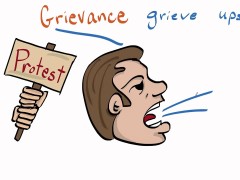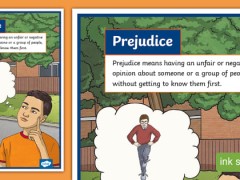evolve [iˈvɔlv] adj. 逐渐形成
【派】evolvement 进展,形成
【扩】form 形成
【搭】evolve from 由……进化而来 evolve into 发展成
high-handed [ˌhaiˈhændid] adj. 高压的,专横的
incompetent [inˈkɔmpitənt] adj. 不够格的,不称职的
【反】competent 能胜任的
* * *
A: He is quite incompetent to do the work.
B: OK. I'll have a talk with him this afternoon.
A:他不太能胜任这工作。
B:好的,我下午找他谈谈。
* * *
over-zealously [ˌəuvəˈzeləsli] adv. 过分热情地
safeguard [ˈseifɡɑːd] v. 保护
【构】safe(安全)+guard(守卫)=safeguard(保护)
【搭】safeguard the environment 保护环境
【例】We must safeguard the forest.
我们必须保护森林。
parliamentary [ˌpɑːləˈmentəri] adj. 国会的
qualified [ˈkwɔlifaid] adj. 合格的
【例】I am very happy that I am qualified for this interview.
我很高兴获得了参加这次面试的资格。
grievance [ˈɡriːvəns] n. 不平,冤屈
* * *
A: Jill had kept silent about his grievance.
B: Why didn't he let us know?
A:吉尔对他自己的冤屈一直保持沉默。
B:他为什么不告诉我们?
* * *
Justiteombudsman [ˈdʒʌstaitˈɔmbədzmæn] n. (瑞典的)司法特派员
ombudsman [ˈɔmbudzmən] n. (瑞典和英国的)司法特派员
secretive [ˈsiːkrətiv] adj. 保密的
【扩】surreptitious 保密的
【例】The process is kept so secretive that none of the companies knows who it is bidding against, or how many rivals are involved.
整个竞标是严格保密的,没有一家公司知道自己的对家是谁或者有几家公司参加竞标。
correspondence [ˌkɔriˈspɔndəns] n. 来往信件
alter [ˈɔːltə] v. 改变
【派】alternative 另类的
* * *
A: Can you alter this suit for me?
B: Sure. How would you like me to alter it?
A:你可以为我改一下这套衣服吗?
B:当然可以。你要我怎么改?
* * *
accusation [ˌækjuˈzeiʃən] n. 谴责,指控
【例】He evidenced his accusation with some material evidence.
他以一些物证作为控告的证据。
ascertain [ˌæsəˈtein] v. 查出,查明
【派】ascertainable 可查明的
【例】I'll endeavor to ascertain her mind.
我得先努力弄清楚她的想法。
prejudice [ˈpredʒədis] n. 偏见
prompt [prɔmpt] v. 敦促,激励;adj. 即时的
【扩】inspirit 激励
* * *
A: What prompted her to be so generous?
B: Maybe nobody knows except her.
A:是什么原因使得她如此大方呢?
B:也许除了她自己没人知道。
verb [vt. 及物动词]进化,演化;逐步发展,逐渐演变 - So why would animals evolve a characteristic that seems to endanger them?
adjective [原级]无能力的,不称职的;<法律>无资格的;(医)(尤指瓣膜或括约肌)无机能的 - He wants the power to fire incompetent employees.
noun [专属名词]无能力者 - The president turned furiously on his staff. "I'm surrounded by incompetents!"
adverb [方式副词]过于热情地 - The taxcollectors can make mistakes or act over-zealously.
noun [具体名词]保障条款, 保护措施 - As an additional safeguard against weeds you can always use an underlay of heavy duty polyethylene.
verb [vt. 及物动词]保护,护卫 - The new card will safeguard the company against fraud.
adjective [原级]议会的,国会的,设有议会的 - The minister air-dashed to Delhi because of the parliamentary crisis.
adjective [原级]具备…的学历(资历)的;(尤指做某项工作)有资格的,胜任的;(支持、赞同)有限度的,有保留的 - He qualified as a doctor last year.
verb [vi. 不及物动词]取得资格(或学历),合格;使具备资格,使合格;达标,取得参赛资格(qualify 的过去式和过去分词形式) - Nursing auxiliaries provide basic care, but are not qualified nurses.
noun [具体名词]不满,不平;委屈,冤情;投诉 - The main grievance of the drivers is the imposition of higher fees for driving licences.
noun [专属名词](瑞典的)司法特派员 - The official title of the person is 'Justiteombudsman', but the Swedes commonly refer to him as the 'J. O. ' or 'Ombudsman'.
adjective [原级]高压的;专横的;目空一切的 - He wants to be seen as less bossy and high-handed.
noun [专属名词]监察专员(专门负责调查人民对政府各部门控告案件的官员);视察官 - The leaflet explains how to complain to the banking ombudsman.
adjective [原级](人,组织)保密的,守口如瓶的;(状态,活动)隐瞒的,秘密的;(人的表情,举止)难解的,诡秘的 - He's very secretive about his work.
noun [不可数名词]信件,信函;通信;相似,关联 - The judges' decision is final and no correspondence will be entered into.
verb [vt. 及物动词]改变,改动;(使)变化;改(服装);改建(某建筑);<美>阉割 - Nothing has altered and the deadline still stands.
noun [具体名词]控告,指责,谴责;(尚未证实的被控告的)罪名,罪状 - She was deeply pained by the accusation.
verb [vt. 及物动词][常用于书面语]查明,确定 - Through doing this, the teacher will be able to ascertain the extent to which the child understands what he is reading.
adjective [原级]怀偏见的;有成见的;偏颇的 - Some landlords and landladies are racially prejudiced.
verb [vt. 及物动词]损害(prejudice 的过去分词);使抱偏见 - Some landlords and landladies are racially prejudiced.
verb [vt. 及物动词]促使,导致;鼓励,提示(说话者);(计算机上)提示;(给演员)提词,提白 - If you prompt someone when they stop speaking, you encourage or help them to continue. If you prompt an actor.
noun [具体名词](给演员的)提词;(计算机屏幕上显示准备接受指令的)提示; 鼓励,催促;(付款通知单上的)付款期限 - You can also call any command or function at the prompt.
adjective [原级]迅速的,立刻的;(人)利索的,敏捷的;及时的,准时的;(商品)即期要送的,即期要付的 - A prompt action is done without any delay.
adverb [时间副词]准时地 - The meeting will begin at ten o'clock prompt.
















